by Martin Willis
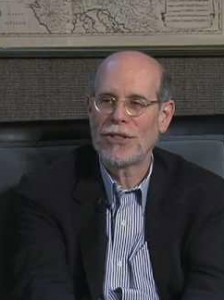 This week’s podcast is an interview with Harold Holzer, one of the leading scholars on Abraham Lincoln. I am very thrilled to write this article about Abraham Lincoln’s writings and some of my thoughts on the great leader.
This week’s podcast is an interview with Harold Holzer, one of the leading scholars on Abraham Lincoln. I am very thrilled to write this article about Abraham Lincoln’s writings and some of my thoughts on the great leader.
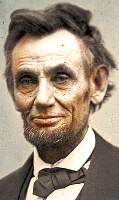 Abraham Lincoln is one of my favorite people in history and has been since I learned about him at an early age. It helped that a friend of mine in grade school was a direct descendent as well. Besides our founding fathers, there is no other example of any president who gave of himself so completely to shape our nation. He had extremely difficult decisions to make, in some he stood alone, yet almost all of them were the best judgment that one could have made. We look at history as a backward glance. We see the events and the outcomes of decisions as the solid past. He was living in such turbulent moments and trying to change a way of wrongful thinking. Our country was founded and continued with slavery as a way of life. Through all of Lincoln’s actions, he was walking with unsure footing on thin ice.
Abraham Lincoln is one of my favorite people in history and has been since I learned about him at an early age. It helped that a friend of mine in grade school was a direct descendent as well. Besides our founding fathers, there is no other example of any president who gave of himself so completely to shape our nation. He had extremely difficult decisions to make, in some he stood alone, yet almost all of them were the best judgment that one could have made. We look at history as a backward glance. We see the events and the outcomes of decisions as the solid past. He was living in such turbulent moments and trying to change a way of wrongful thinking. Our country was founded and continued with slavery as a way of life. Through all of Lincoln’s actions, he was walking with unsure footing on thin ice. 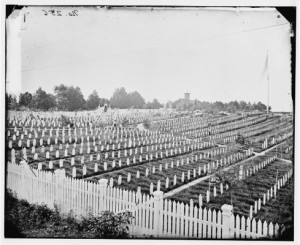 As the losses mounted during the Civil War, the burden of it all aged him greatly, yet he plodded on. He lived just long enough to see that his dream and efforts were coming to fruition. It was a sad day in 1865 when John Wilkes Booth stepped forward with common feelings of many other Confederate sympathizers and detractors to take the life of the great man. One can only speculate the additional achievements Lincoln would have made with the nearly four years remaining of his presidency.
As the losses mounted during the Civil War, the burden of it all aged him greatly, yet he plodded on. He lived just long enough to see that his dream and efforts were coming to fruition. It was a sad day in 1865 when John Wilkes Booth stepped forward with common feelings of many other Confederate sympathizers and detractors to take the life of the great man. One can only speculate the additional achievements Lincoln would have made with the nearly four years remaining of his presidency.
This is not a specific history lesson, as it would take me too long to write about the amazing life of Lincoln starting from his humble beginnings through his presidency. What I will discuss is Abraham Lincoln’s documents, letters and signatures. I have handled dozens of these in my career and had the honor of handling the second to last writing that the great man penned just before he left for Ford’s Theater on April 14, 1865. Even though it was only one sentence, it was amazing to hold in my hands the second to last thing he put down on paper. See article here.
As in Thomas Jefferson, Abraham Lincoln wrote many thousands of letters and had an amazing artistic talent for the craft of writing. The Gettysburg Address had only 272 words, yet so much was said in that brief speech that it lives on as one of the greatest in American history. Here is a wonderful example of Lincoln’s talent in a letter he wrote to his son’s teacher. Click here to read.
His law career spanned for over 25 years and his signature was on thousands of documents during that time. Signatures of all presidents are more valuable during the time that they are in office. Lincoln’s writings during the time he was a lawyer and before is not as valuable unless substantial for a particular reason. A large number of deeds, wills and similar documents were clipped for his signature over the years. ![]() You will often find clipped signatures mounted and framed under an image of Lincoln. These “clipped signatures” are the least valuable of his writings. Depending on the vibrancy of the ink color they usually sell at auction for around $2-3,000. With all the legal documents he produced, you can just imagine how many are undiscovered and sitting in attics or storage. Some will continue to remain that way until they are disposed of or disintegrate by being uncared for. If your family had any connection with Lincoln in anyway, make sure to explore all known remaining documents.
You will often find clipped signatures mounted and framed under an image of Lincoln. These “clipped signatures” are the least valuable of his writings. Depending on the vibrancy of the ink color they usually sell at auction for around $2-3,000. With all the legal documents he produced, you can just imagine how many are undiscovered and sitting in attics or storage. Some will continue to remain that way until they are disposed of or disintegrate by being uncared for. If your family had any connection with Lincoln in anyway, make sure to explore all known remaining documents.
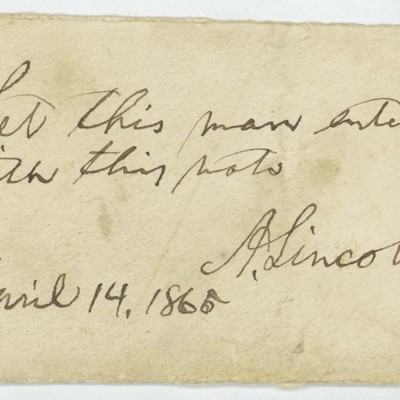 The descendents of Hugh McCulloch, Lincoln’s Secretary of the Treasury lived in the family home in Kennebunkport, Maine. They called me with some items for sale and I was able to visit their beautiful Colonial home in what used to be the center of town. This home was built for the family in the 1700s and still had a number of original period furnishings. The walls on the second floor bedrooms were hinged and would latch to the ceiling to create a ballroom for the entire second floor. It was a fantastic early home. They had a number of McCulloch’s affects including his desk from the Capitol that was curved in design and would connect to other desks to form a semicircle. While I was writing up the consignment contract for the desk and other period furniture, I looked over at the wall and saw a one-page letter with the distinct writing and signature of Lincoln. I asked if I could take a minute and read it. I do not remember the content of the letter as I almost fell over when I read the date. I asked them if they realized that it was Lincoln’s last day when he wrote it. They told me they had dozens of Lincoln’s letters in a safe and enjoyed hanging that one on the wall. Needless to say, I could not talk them into consigning it.
The descendents of Hugh McCulloch, Lincoln’s Secretary of the Treasury lived in the family home in Kennebunkport, Maine. They called me with some items for sale and I was able to visit their beautiful Colonial home in what used to be the center of town. This home was built for the family in the 1700s and still had a number of original period furnishings. The walls on the second floor bedrooms were hinged and would latch to the ceiling to create a ballroom for the entire second floor. It was a fantastic early home. They had a number of McCulloch’s affects including his desk from the Capitol that was curved in design and would connect to other desks to form a semicircle. While I was writing up the consignment contract for the desk and other period furniture, I looked over at the wall and saw a one-page letter with the distinct writing and signature of Lincoln. I asked if I could take a minute and read it. I do not remember the content of the letter as I almost fell over when I read the date. I asked them if they realized that it was Lincoln’s last day when he wrote it. They told me they had dozens of Lincoln’s letters in a safe and enjoyed hanging that one on the wall. Needless to say, I could not talk them into consigning it.
As an appraiser I have been asked dozens of times over the years if newspapers have value. I always say there are only a few that have any value, such as Lincoln’s Assassination. A reward broadside (poster) can sell for as high as $80,000. This is an example of how much Lincoln remains venerated by collectors of Lincoln memorabilia.
Most of Lincoln’s signatures such as discharges and commissions are signed: “A. Lincoln”, but he did sign a full signature occasionally. As all things of value there are fakes and some people are pretty good at it. The forgers look for blank period paper that can be found at auctions and other venues. If you are looking to buy a letter or signature, make sure your source is solid and remember if it is too good to be true then it is just that. There are lithographs of Lincoln’s portrait with his signature below. A number of people have shown these to me thinking they have an original signature.
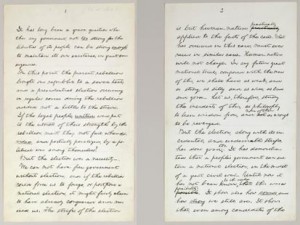 As far as record prices of Lincoln’s work, a copy of copy of the Emancipation Proclamation signed by Lincoln and previously purchased by Robert F. Kennedy has sold for more than $3.7 million in New York City last December 10th. Secondly, his election victory speech, hand written and delivered by him from the White House window on the evening of November 10th, 1864 sold at auction for $3, 442,500.
As far as record prices of Lincoln’s work, a copy of copy of the Emancipation Proclamation signed by Lincoln and previously purchased by Robert F. Kennedy has sold for more than $3.7 million in New York City last December 10th. Secondly, his election victory speech, hand written and delivered by him from the White House window on the evening of November 10th, 1864 sold at auction for $3, 442,500.
To give a few examples of other average prices, Civil War commissions, depending on who they are for and the condition can sell for as little as $2,500 to around $7,500 up. Lincoln letters generally sell from $5,000 up. Content and condition is everything.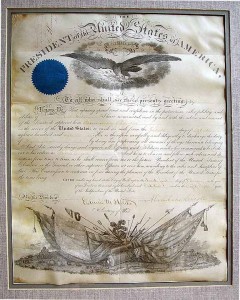
A few other examples of other Lincoln articles that sold at auction are: his spectacles for $150,000, a wooden inkstand, $67,500 and a pair of brass dividers used by him sold for $70,000. Keep in mind that there are probably hundreds of  thousands of items that people claim belonged to Lincoln. This is called “family hearsay” in the antique and auction business and very difficult to prove. The pieces I mention above had solid provenance leading back to the 16th president.
thousands of items that people claim belonged to Lincoln. This is called “family hearsay” in the antique and auction business and very difficult to prove. The pieces I mention above had solid provenance leading back to the 16th president.
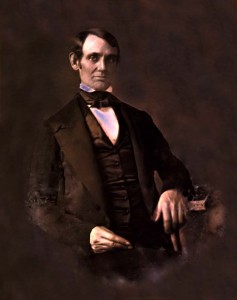 Collectors aggressively seek rare images of Lincoln as well.
Collectors aggressively seek rare images of Lincoln as well.
The Abraham Lincoln Presidential Library and Museum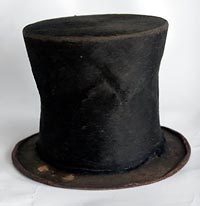 acquired the renowned Taper Collection in 2007, partly though the generosity of the Taper family. It is an unparalleled collection of more than 1,500 artifacts, manuscripts and artworks that span Lincoln’s entire life including his famous stovepipe hat. From what I understand it is an in depth collection well worth the viewing.
acquired the renowned Taper Collection in 2007, partly though the generosity of the Taper family. It is an unparalleled collection of more than 1,500 artifacts, manuscripts and artworks that span Lincoln’s entire life including his famous stovepipe hat. From what I understand it is an in depth collection well worth the viewing.
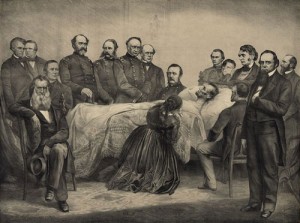 The Secretary of War, Edwin Stanton was one of the people who remained at Lincoln’s side during his final hours. At the end he was quoted as saying “Now he belongs to the ages” and he does. He remains for evermore in our hearts and our nation’s history.
The Secretary of War, Edwin Stanton was one of the people who remained at Lincoln’s side during his final hours. At the end he was quoted as saying “Now he belongs to the ages” and he does. He remains for evermore in our hearts and our nation’s history.
Click here to listen to the podcast with Harold Holzer.
Pingback: Antique Auction Forum » Abraham Lincoln Scholar Harold Holzer
I am the gr.-gr.-gr.-gr. granddaughter of Lincoln’s tailor (Benjamin R. Biddle) in Springfield, Illinois. And I just received 2 books. One was written by my gr.-great grandmother, published in 1944, about the Biddles. The other is the Biddle’s Bible from 1854. The 1944 book has historical accounts of moving the state capital from Vandalia to Springfield, personal conversations with Lincoln and about being neighbors with him, then moving the Biddle family across the Oregon Trail, and helping establish Oregon State University. They are my family’s history, so I don’t think I would sell them, but I’m just wondering what you think they might be worth?